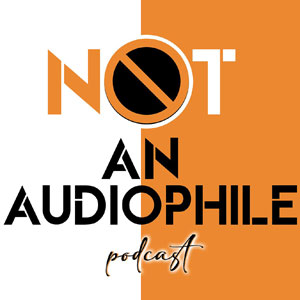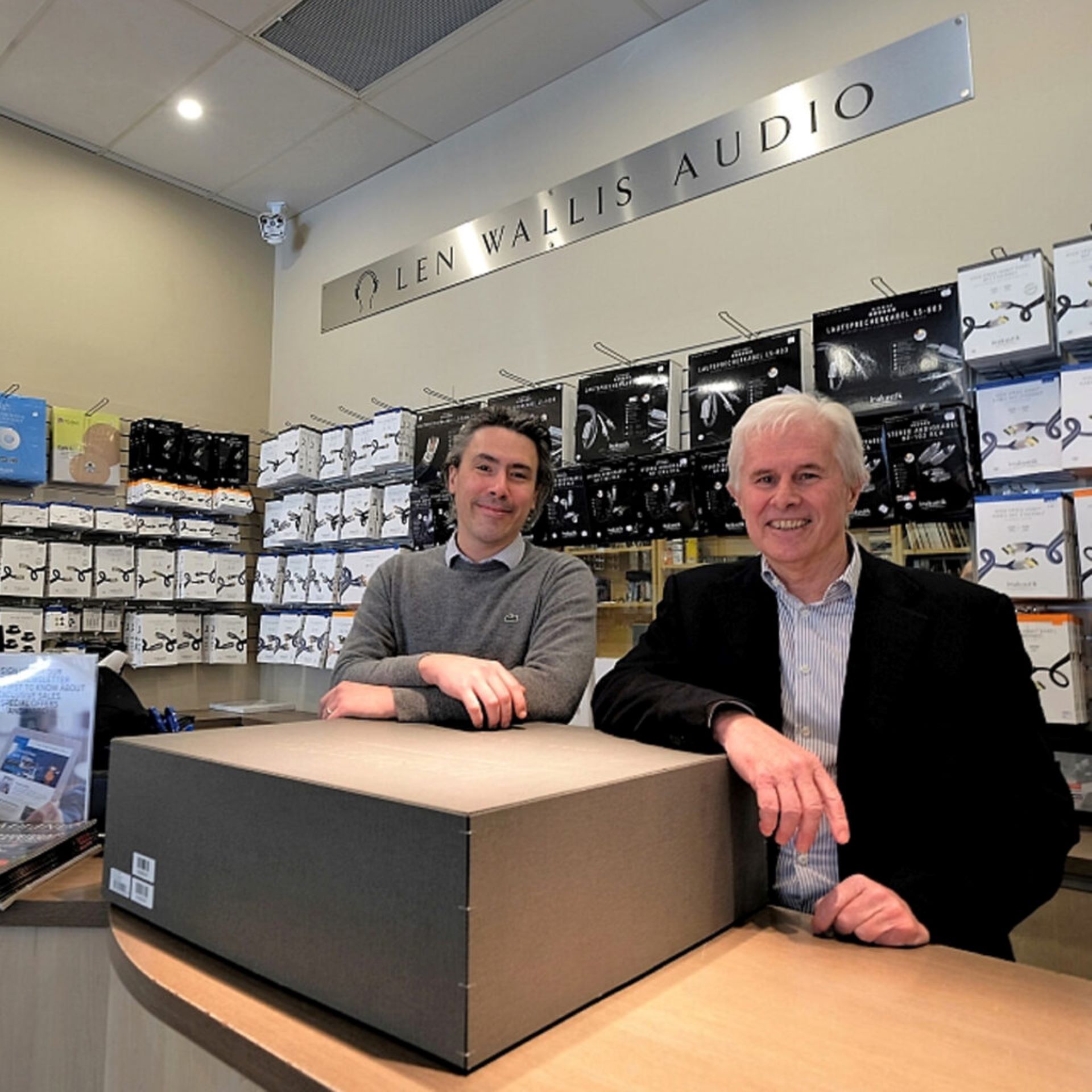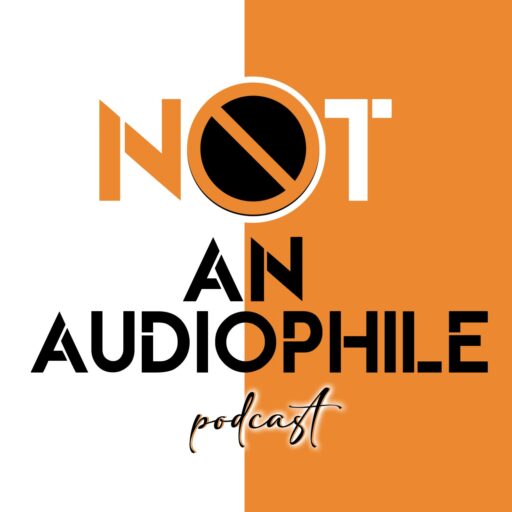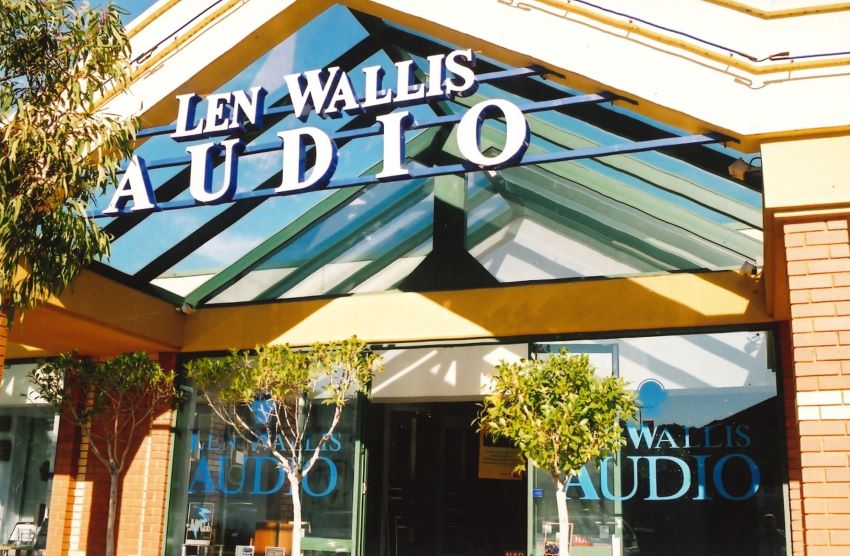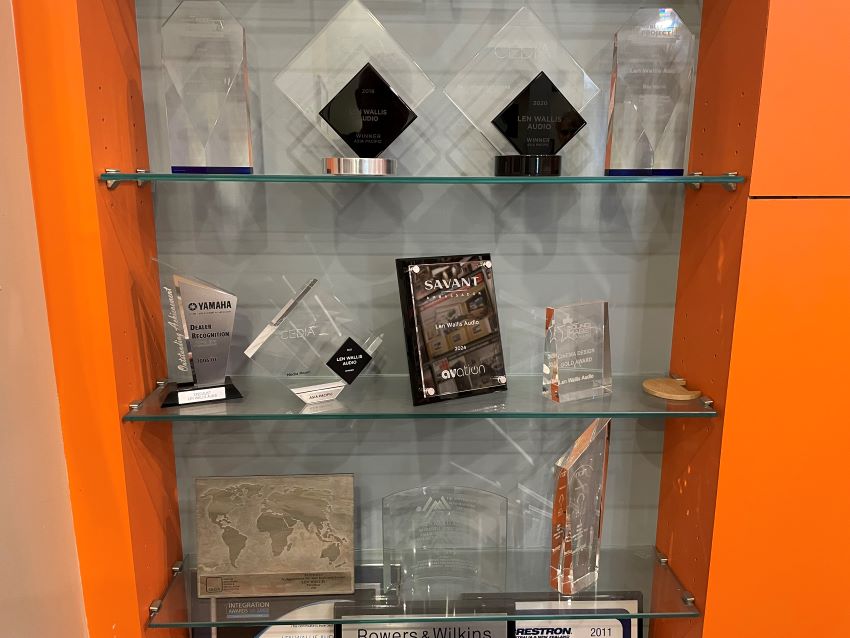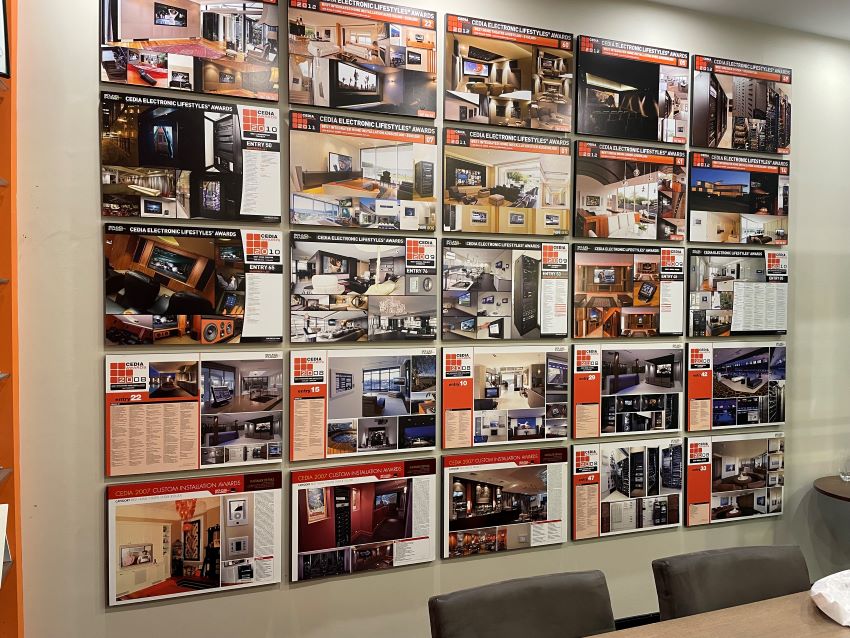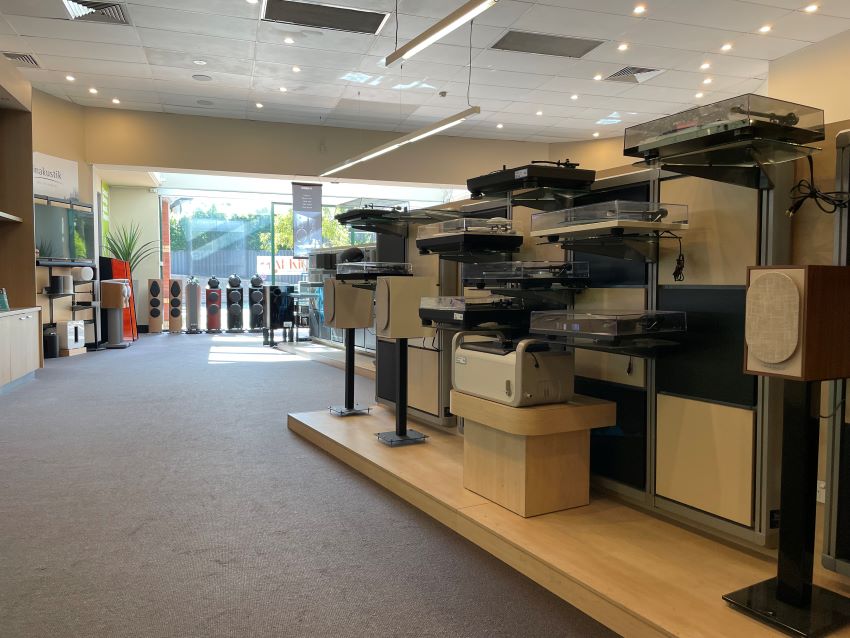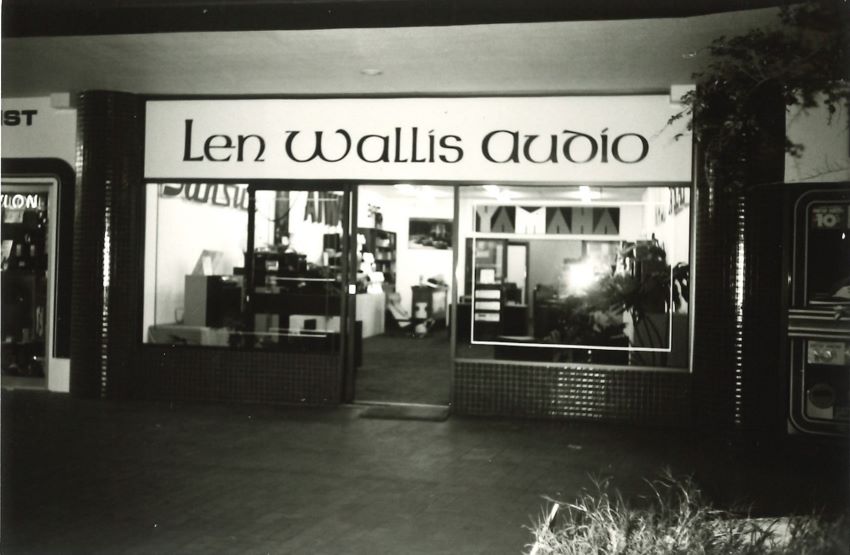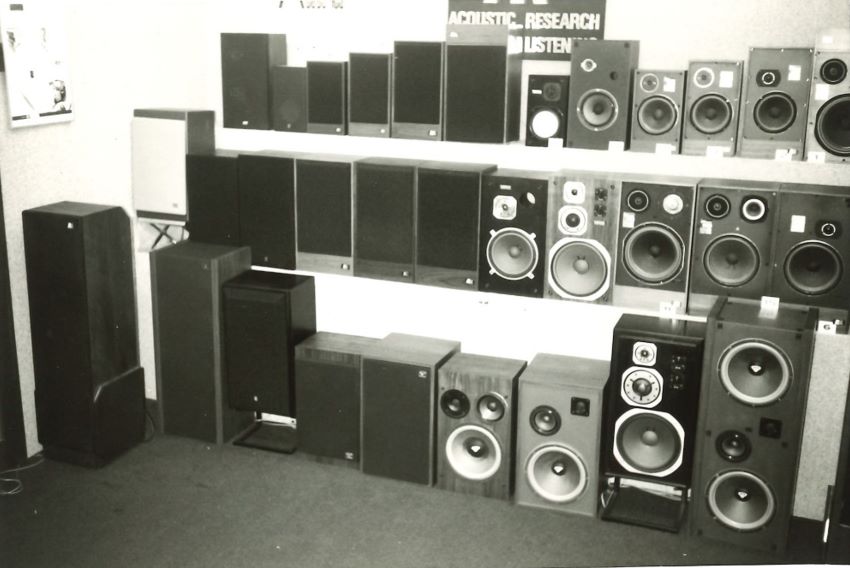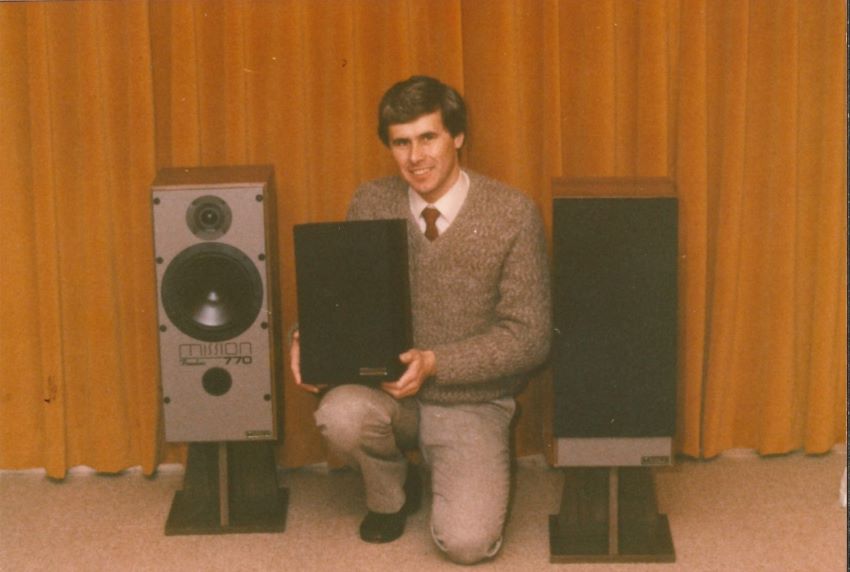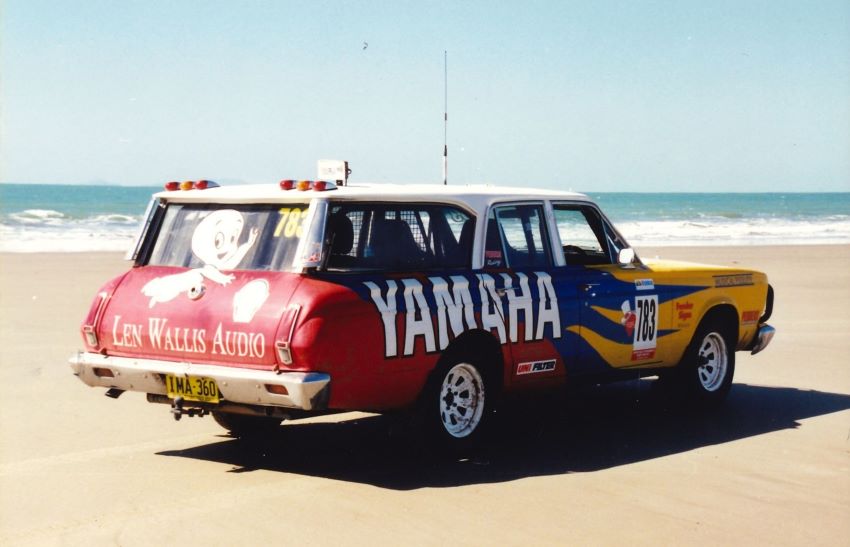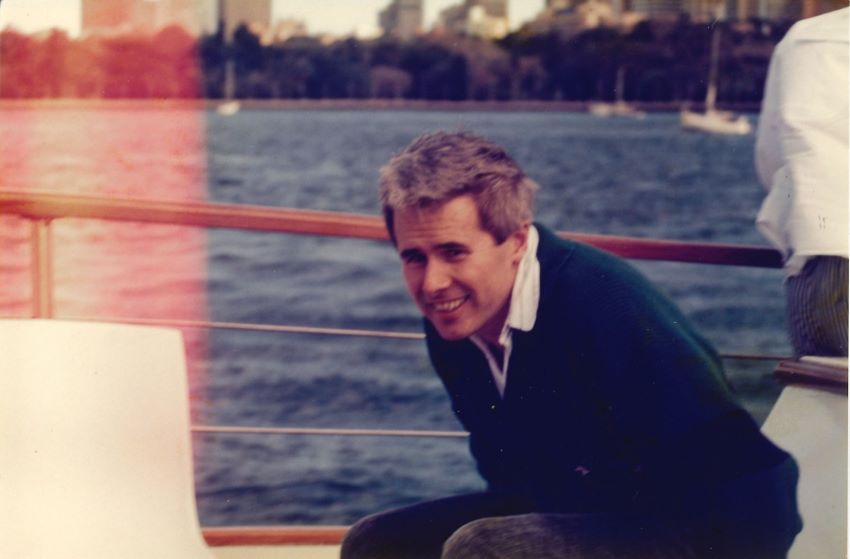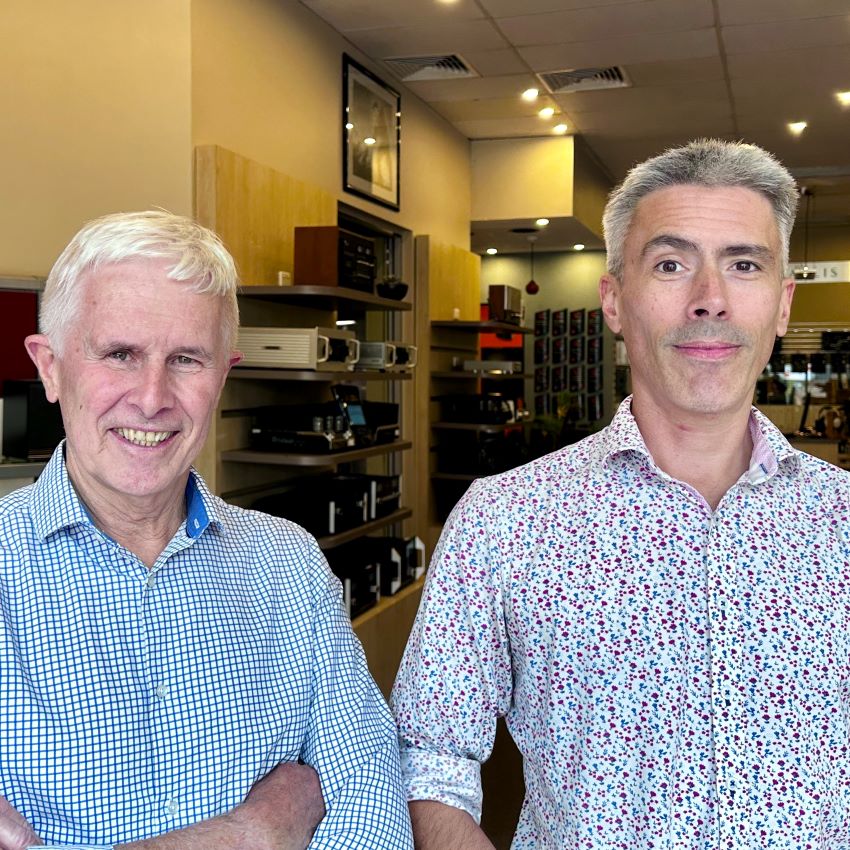Not An Audiophile – The Podcast featuring podcast episodes with Len Wallis and Tim Wallis of Len Wallis Audio. Voted in the Top 5 Audio Stores in the World in 1990, Len Wallis Audio provides a unique perspective into HiFi past, present and future.
Podcast transcripts below – Episode 026
Stereonet 2017 – Article – Enthusiast of Today – Len Wallis Audio



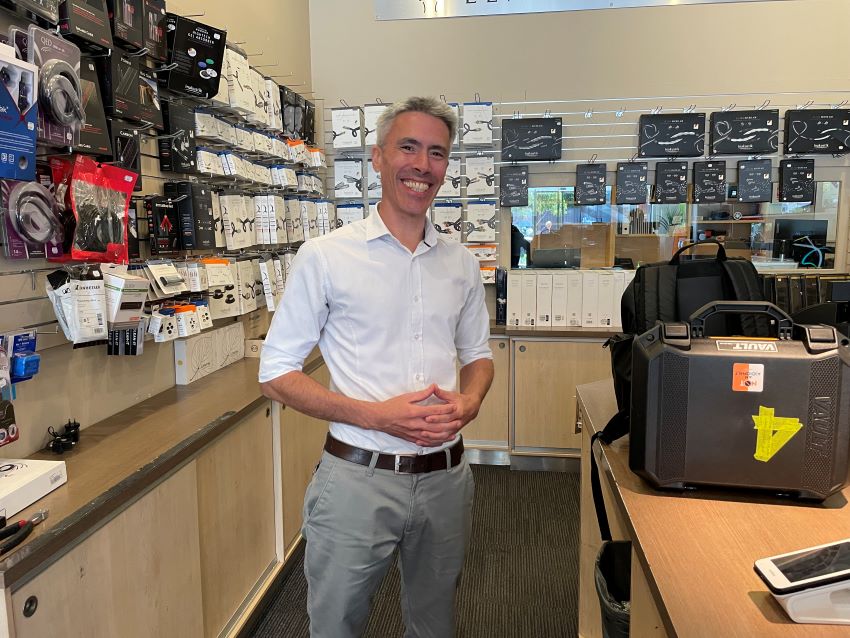
TRANSCRIPT
S2 EP026 HiFi retail evolution. A unique perspective past, present & future
Len Wallis: And
Len Wallis: And I suddenly realized there was a guy standing next to me. he was in NRMA uniform, I remember. And he stood there beside me. He looked into the store and he said, another bloody HiFi shop. He said, Autel Systems is going to eat you alive. And he turned around and walked away.
Len Wallis of Len Wallis Audio speaks on not an Audiophile podcast
Andrew Hutchison: Welcome back to not an Audiophile, the Podcast.
Andrew Hutchison: This is episode 26, season, two. And today we speak to really an industry legend, Len Wallis of Len Wallis Audio, the man who started the business back in the very late 70s and continues to be found in the store regularly even today. But his son Tim, who also joins.
Andrew Hutchison: Us, I guess, is slowly taking over the reins.
Andrew Hutchison: Have a this episode of not an Audiophile. The podcast is sponsored by Stereonet. Looking for your tribe? Visit stereonet.com today. Join one of the world’s largest online communities for HiFi, home cinema, headphones and much more. Read the latest news and product reviews or check out the classifiers for the largest range of gear on sale. Membership is absolutely free, so visit stereonet.com and join up today.
Andrew Hutchison: So thank you gentlemen today for appearing on not an Audiophile, the podcast. we have Len Wallis and Tim Wallis perhaps related. And and my sidekick, Brad Serhan is here for good reason because Brad has a long relationship with, with at least one of these gentlemen, one more than the other. As for those who are not, not familiar, Len is the father of Tim. And Len, started the store that we’re sitting in in 1978, I believe, according to your website. And it occurs to me that in 1978 when you rented the store and started pouring stock into it and money, that you may not have thought you would be here 25 years later than the turn of the millennia, which at that point, at least my memory would be that it would have seemed like a long way away, even to the year 2000, which of course the, the gag, wasn’t it? Oh, what will we have in the year 2000 when you saw that, and then 25 years later. Not trying to make you sound old because you don’t look old, but, but he looks very fit, doesn’t he? It’s that regime that he, goes through on a daily basis. But the, Or a nightly basis, but. But, I mean, tell me all about it. I mean really, is it a dream or a nightmare?
Len Wallis: Look, I’ve enjoyed it. I’m still doing it, which is. So I must be enjoying it. I still believe that there’s probably not a better industry in the world to work in. There’s very few downsides. Indeed, it’s been very good.
Andrew Hutchison: Full of nice people. Full of nice people, mostly.
Len Wallis: Yeah. A couple of exceptions. You’re dealing in music, you’re dealing in entertainment. To get that across to people, you know, we could be dealing in selling socks or something like that, you know, which is really boring. But this is. This is a lot of fun, you know.
Andrew Hutchison: Well, it’s ever changing.
Len Wallis: It’s ever changing.
Andrew Hutchison: Yeah, that’s because,
Tim was born into the HiFi industry; he’s been here for decades
And I suppose the second part of that question is directed to Tim as someone who clearly grew up not just at a house, I, ah, assume a house full of HiFi. Not full, but obviously a substantial HiFi system somewhere, surely. which I might ask you about in a minute. But did you see yourself, Tim, being here today as well? Because my understanding is you’ve actually been. My estimation was you’d been here for 10 or more years, but I think much longer.
Tim Wallis: Much longer than that. Yes. No, I didn’t have any real plans to land here. I was lucky enough to be obviously born into the opportunity. But out of school I just sort of started, I started in the storeroom and worked my way through the box, you know, shit, kick and roll, as we call it back then, and then through the installation side and into sales. So it was good. I mean, I had no formal training in the industry or any studies based on what would. What would be relevant here. But by going through all of the facets of it, I kind of got a very broad overview of it and, you know, one day led to another, one month, one year and one decade led to another.
Andrew Hutchison: I think that may be how, ah, it works for most of us. Yes.
Tim Wallis: Yeah, but like Len says, I mean, it’s, it’s a joy. It’s. It’s as far as we’re, you know, what we do is. Is amazing. So I couldn’t be happier. I couldn’t think of myself being in any other place at this.
Andrew Hutchison: It’s a lot of fun. I mean, you’ve got toys, electronics, m. Gadgets and music, so. And nice people.
00:05:00
Andrew Hutchison: I mean, I think I’m reminded sometimes when I go to the, supermarket or something where I bathe in the great unwashed briefly. but yeah, our customers are fantastic people. Not all humans are as nice as people who buy great music playback systems and enjoy music. I mean, bizarrely. And you must have met these people then There are people who don’t have a stereo at home and don’t enjoy.
Len Wallis: Music, which, to Be honest, I still find quite. It’s bizarre, strange. And I know there are people. I’ve got a great affinity for music. I’m in this industry for the music, not the high flies. That’s what started me in it. And I have a great connection to music and I find it interesting that there are people who don’t. I mean, I can go to a concert and stand there and be just totally immersed, absolutely immersed in what’s going on. And I remember once, many years ago, going to, a Wagner opera, which I think it was just fantastic, you know, And I was sitting there, tears running down my cheek, and, I’m thinking, this is just fantastic. And of course, it came to an end and I was sitting there thinking, thank God everybody’s walking in the same direction, Right. Nobody’s looking back at me. Until I got to the door, exit door. And one of our clients standing there, who was the usher, looked at me and said, hello, Len
Andrew Hutchison: It’s actually. It’s funny that’s. I mean, that. That was obviously not funny at the time, but, that happens.
A good HiFi system can still create an illusion of detachment from reality
But also the other thing that I. Because I was at a gig last night, and what I find disturbing with how. So this event came to an end quite suddenly almost. And then the lights come up and everyone just files out as if they were just filling up with petrol. What I’m getting at is that you’re in this moment immersed, and you are immediately like, someone’s on the lighting control and the lights come up and you’ve just got to immediately snap out of this amazing experience and then just file out like cattle.
Len Wallis: Yeah.
Andrew Hutchison: I was just reminded of it last night while it was happening. This is so weird. I’d like to just sit here and bait. I mean, the same way as you watch a movie. Well, I watch a movie, I’m quite happy. Or if I’m in the cinema watching a movie, just to let. To sit there and watch the Crest and the music. Yes. And you kind of. I guess you come out of that zone. But bizarrely, in a theatre or a concert hall or what have you. Yeah. You kind of have to snap out of it a bit. Which everyone who’s there must find that.
Len Wallis: I think movies. I always think a good indication of how good the movie is is how many people do sit there and watch the credits. I think if it’s, a fantastic movie, everybody just sits there, you know, and again, they’re sort of coming down.
Brad Serhan: Off the experience from a dream, you know, coming out.
Len Wallis: Yeah, but. No, no, but As I say, I mean, that’s the beauty of this industry. That’s the sort of stuff we’re dealing in all day and we sort of, you know, m. I’m a great realist in the fact that we are never ever, ever going to recreate the event in our lounge room. Yeah, right. But at least we’re doing an approximation of that and we’re showing people that this is what you can have. Sonic illusion. Sonic illusion, yeah.
Brad Serhan: Basically trying to trick ourselves into.
Len Wallis: Well, you know, we’re getting as close as we can, you know, so it’s always a wake up call.
Tim Wallis: You can still engage that immersion, you can still create a feeling, evoke an emotion of total detachment of the world. When you’re listening to a good HiFi system. For example, when I, if I’m having a bad day or something, I can jump into one of the rooms here and put on some music and it can put me in a different state where, you know, and I find that that’s even when I’m listening to a good system, when people often ask you what do you listen for in a system? And what is an indication to you that this is a good sound or whatever. No, one thing that I’ve always found is that my mind, when my mind wanders, if I’m listening to some music and I start. If I start thinking about was that beat right? Was that symbol accurate? My mind is stressing and it’s not, it’s not really I get a sense that that’s not a balanced sound for me. But when I sit there thinking, what am I going to have for dinner? Am I going to have tacos? Or my mind is allowed to just.
Brad Serhan: Free you up, Just go and do it.
Tim Wallis: So I think it’s comfortable enough in the moment of the music, with the music to just let that be in its part mentalised sort of state and my brain’s free to do its own thing. And that to me, when the music’s over again, back to work. But that, like what you’re saying about that coming out of that zone, you can. Even though you’re not going to get the whole package like you get at an event, you can still at least recreate some kind of sanctuary for your mind to just zone out.
Andrew Hutchison: Absolutely. And I mean that’s where clearly, a better system could take you further away from reality, I guess, or closer
00:10:00
Andrew Hutchison: to, or even just. We’ve all heard those systems where you really are, they jolt you, you’re taken with the sound. But of course it Makes the musical performance so much more enthralling. And you, you know, that’s what people pay the big bucks for, I guess.
Len Wallis: But also the.
Andrew Hutchison: Other than the extra flashing lights.
Brad Serhan: Yeah, but the argument is that the art or skill set is to.
Andrew Hutchison: You don’t have to have big bucks.
Brad Serhan: And so if you’ve got people who.
Andrew Hutchison: Can, when you don’t, you can actually.
Brad Serhan: What the tip you say is that what audio brings and good quality HiFi shops bring to the equation is that, okay, if you’re wanting to spend 10 grand, 5 grand, 20 grand, it’s still possible to have a system that can actually still do a fair approximation and get your foot tapping.
Andrew Hutchison: And.
Brad Serhan: That’S where the skill sets come in.
Andrew Hutchison: That’s why, yes, for those listeners who are not, don’t have firm ideas on, you know, their favorite brands or whatever, I mean, that’s where a specialist HiFi store clearly, is, is a, is a great aid and much better than shopping on the Internet where you can, you can look, feel and listen to the gear. And you’ve got a skilled, and experienced salesperson. You clearly don’t have any here.
Len Wallis: You.
Andrew Hutchison: Know, but I mean, you know, consultants, consultants who do and no doubt have experimented, you know, in the in the, in the after work with different combination and combinations or perhaps even, I mean in my case when I was selling equipment, you know, a customer might have a preference. They’ve done some research and they, and they drag you down their rabbit hole of choices and you do. Sometimes you’re surprised how well that works. I mean, the point is the people working in shops like yours, your both store, I don’t know whose store it is. It’s a team, a team thing. But the point is you, you do this day in, day out for years. Len’s done this now for over 12 years, I believe. you know, you, you know a huge amount. There’s a, there’s an enormous oral knowledge, isn’t there?
Len Wallis: It’s almost second nature that you do know what is going to work and if you can, you know, ask the right questions of a client and you say, look, you know, you know, you tell me about your listening habits and what you listen to and the size of your room and all of that sort of stuff, where’s the setup? You could pretty very, very quickly put a package together that’s going to do that. And you only do that because, as I say, we’ve both been doing it for a long, long time. So over those times, you come to Work, Know what’s going to work, what’s not going to work, you know, for different clients.
Andrew Hutchison: Absolutely.
Tim Wallis: Basic philosophies that still ring true and have been true for decades. As long as you follow those in terms of the basic fundamentals of a good HiFi system. A speaker is a speaker, an amplifier is an amplifier, a source is a source and you put them together, you position them properly. It doesn’t like harping back to what you said. It doesn’t have to be big money that you throw at. it, it’s just a case of balancing and designing and implementing the basic concept of what a HiFi balance.
Brad Serhan: Is, dare I say the flavors in a sense. So then you get result that turns the customer on.
Tim Wallis: Flavors are another, you know, a whole other thing when you think about there isn’t a right or wrong sound theoretically in the tonality of sound. And one thing that we find is very interesting with customers is you can put something together that one person really likes and another person may not like at all, you know, and it’s two different speakers at an equivalent price point, you know, can sound completely different to each other. You can’t say one’s better or one’s worse.
Andrew Hutchison: Where your skills lie is that you can be led. I mean you throw a sample in front of, have a listen to this and they go, oh no, that’s far too whatever. I want something more like this.
Shopping online doesn’t give you that element of discovery when choosing speakers
And then through your experience you can of course, you know, head off, change an amplifier or speakers.
Tim Wallis: Shopping online doesn’t give you that element. When you sit, you can read as much as you like about a speaker or people’s reviews or opinions or you know, the minute you sit in front of it, you’ll tell more in five minutes, you know.
Andrew Hutchison: Absolutely.
Tim Wallis: So that’s really the key. You’ve got to get out and let your ears find the sound that you want.
Andrew Hutchison: It’s an odd, an odd thing, isn’t it that someone I mean obviously researching online is the modern day equivalent of reading, you know, HiFi answers or something. But or you know, one of those American magazines. but you know, but it’s no substitute for, you know, going well this is an award winning amplifier according to three out of five magazines or websites now or YouTube influencer channels. I’ll go and have a listen. And then that’s when the magic really starts.
Len when you kick the store off, how did you, I mean clearly you had an interest in HiFi and you might have had some personal preferences about brands or something. But how did you. How did that work? Was it sort of like, I like the sound of this, so this is what I’m going to sell, or is it sort of. And is that. Is that how the store works now or.
Len Wallis: It is. I mean, I was working for somebody else at the time. and, you know, it came time that I
00:15:00
Len Wallis: thought, well, we really should be doing this for ourselves rather than for somebody else.
Andrew Hutchison: Yes.
Len Wallis: but I knew, the brands, that I wanted. And I remember before we opened, one of the big brands in those days was Acoustic Research for Speakers. It was an exclusive for Douglas HiFi in George street, and they were the only people that had it. And I remember setting up a meeting with Acoustic Research and the guys from Douglas HiFi and saying, look, this is a product I like. This is a product I want to carry. And we sat down and negotiated a deal. And so we opened. It was one of the brands we opened with and it was extremely successful for us because I liked it. I’d had a lot of time with brands like Yamaha, which at the time I knew. Well, you know, a lot of brands that have gone by the wayside now, Aiwa and Sansui and people like that. but they’re all brands that I liked and respected and we’re really lucky enough to be able to gather all of those within the store. So. And I think it helped because at that stage it was a really small store. It was already stuck in Lane Cove sort of out of the way a little bit. We weren’t going to be a,
Andrew Hutchison: Oh, this was an outer suburb.
Len Wallis: We weren’t going to bother anybody. So I think everybody sort of came to the party.
Andrew Hutchison: Well then, to some degree. To some degree. But the HiFi stores did tend to hang around the CBD, didn’t they, in the. In the late 70s. I mean, you know, as I think we were discussing briefly prior when we were doing sound checks, that, there was a bunch of stores in town. I know Brad’s mentioned in a previous podcast where we were going over the history of Sydney HiFi.
Len Wallis: Yeah.
Andrew Hutchison: Or the industry in Sydney. but, yeah, but. So, yeah, you were. You, in theory, wouldn’t have been troubling what Douglas were up to, in a way, because they would have seen you as this little guy, you know.
Len Wallis: Yeah.
Andrew Hutchison: Out of town almost. Yeah.
Len Wallis: And that worked in our favour.
Brad Serhan: So it would have been around 10 stores in the city back in the 78, 79, 80s.
Len Wallis: At least. least. Yeah, There was a whole bunch, you know, as I Say Kent Street, York Street. There’s quite a lot of them. There’s a couple in George Street. There’s Pitt street, you know, down near Central. Asil had a store. there was quite a lot of stores in the city. Even here. in. In. You know, where we. As I say, we were in Lane Cove. There was Milvison’s and Chatswood Auto Systems are up on the highway here.
Brad Serhan: Yeah.
Len Wallis: So there was one in Crow’s Nest. you know, there was.
Andrew Hutchison: Yeah, There were just a lot of HiFi stuff.
Len Wallis: There was just a lot of hifi stores. I remember, and I’ve told this story a number of times, but.
Andrew Hutchison: Go on, do it again.
Len Wallis: I remember the day. The day I opened. When I opened the store.
Andrew Hutchison: It was.
Len Wallis: It was a little store, and we’d really sort of run out of money. We had enough money to put audio all down one wall. In the other wall, I’d put plants.
Andrew Hutchison: Because they were cheap.
Len Wallis: I remember the first day I opened the store and I opened the doors, and I stood in the doorway looking back along into the shop, and I suddenly realized there was a guy standing next to me. he was in NRMA uniform, I remember. And he stood there beside me. He looked into the store and he said, another bloody HiFi shop. He said, autel Systems is going to eat you alive. And he turned around and walked away. This is a great start.
Brad Serhan: You know, you’ve always got to have.
Andrew Hutchison: A few, gangsters like that.
Brad Serhan: Those people are important. The generosity is spirit of that bloke.
Andrew Hutchison: The generosity.
Brad Serhan: What I found over the.
Andrew Hutchison: The. Your generosity of spirit towards the generous.
Brad Serhan: Spirit is that, in fact, they’re the perfect. They’re the perfect foil for you because you fire up and say, yeah. Did you react that way, Len, or just you go, oh, you know, puck out your lips and go, oh.
Andrew Hutchison: Were you taking it back a bit? Because it was day one.
Len Wallis: It was day one.
Andrew Hutchison: You were hoping for a more positive.
You clearly grew the store dramatically larger in the 80s
Len Wallis: Yeah, right. It wasn’t a great start, but anyway, that was all, All came to pass.
Andrew Hutchison: Did you? We’re not going to harp on in the past too much because it’s, you know, it’s a long time ago. It’s not really that long ago. Maybe it is, but the, Did you make a sale? Day one, was it. You did. Wow. Okay. So that’s a great start.
Len Wallis: We’ve, always thought it was your.
Andrew Hutchison: Mother, but, I mean, you know.
Len Wallis: Yeah, that was good.
Andrew Hutchison: Okay.
Brad Serhan: Do you remember any nra, NRMA signage up on the wall after that?
Len Wallis: I Don’t know why that, sticks in my mind.
Tim Wallis: I just remember the guy with the.
Len Wallis: Uniform he was in.
Andrew Hutchison: So, you know, you. You, as I say, we’re not gonna. We’re not gonna hang around in the 70s for too long. But zipping through the 80s, you clearly grew the store dramatically larger. And what do you put that down to? I mean, was it the exceptional customer service or was it the, I’m implying you had good customer service.
Tim Wallis: I don’t know.
Andrew Hutchison: Maybe the service was terrible. But I bet it wasn’t, though.
Len Wallis: Yeah. Look, I think we just grew. The industry was growing as well in those days. It was still growing before it really
00:20:00
Len Wallis: peaked. and it grew for us. And as we added more brands, did I have enough money to put stock.
Andrew Hutchison: On the other side instead of the Palms?
Len Wallis: and, you know, and our staff grew and so forth. We just physically run out of room where we were space. So we actually moved across the road.
Andrew Hutchison: Yes.
Len Wallis: Simple as that. Into a much bigger.
Andrew Hutchison: Which makes for a simple move. Yeah, it was.
Len Wallis: It was, It was.
Brad Serhan: Was that the. The premises in the. Tucked away in the arcade?
Len Wallis: In the arcade, yeah, down the back of the arcade there. So. So we went from, you know, having a single demo room to having, you know, five demo rooms, which was a. Which was a big plus.
Andrew Hutchison: It was a pretty big deal on a day. Five demo rooms. Yeah.
Len Wallis: It made. It made a big difference for us.
Andrew Hutchison: and then at some point, my memory. And I don’t know when this was because it’s vague for me, but at some point, you won best HiFi shop in the world or something. We must have paid good money for that.
Len Wallis: There’s a magazine in England who listed what they said were the five best stores of the world.
Andrew Hutchison: Okay.
Len Wallis: And there’s Graham’s in London and Babel in Canada and Lyric and New York and so forth. And they picked us in Australia.
Andrew Hutchison: Wow.
Len Wallis: So, that was a big bonus. Yeah.
Andrew Hutchison: well, actually, we’ll take a quick break. Two seconds. I mean, got a plan ad so we can pay for this because your appearance fees are almost excessive. We’ll back back in a sec, folks.
Andrew Hutchison: I was just talking to Geoff at Heynow HiFi about, his latest installation. Another dome and turntable. This time one with a supatrac Blackbird arm, and a Mutech Hayabusa cartridge. Motorcyclists everywhere are wondering how that could be. Blackbird Arm Hayabusa cartridge. anyhow,then he was. Said he was going back to the store to listen to some records. On the Helix 2 in store unit, I thought, do you ever get sick. Of listening to records? But then maybe not playing them back through, the Fischer and Fischer speakers that are crafted from Slate. Anyhow, enough discussion of Geoffs antics.
Andrew Hutchison: Back to the show.
Len Wallis: And we’re back.
Andrew Hutchison: We’re back at Len Wallis audio with Len himself and his foil, Tim, his son. I’ll edit that in such a way that I close up that pause, and it’s not so obvious that I don’t know what I’m doing.
I feel like in your wholesale division you have relationships with some brands
hey, so I m mentioned earlier, you know, brands. I have a sneaking suspicion, that you have had relationships with some brands for a very long time. And I don’t know what those brands are, but I feel like in your, wholesale division, which we don’t have to talk about, we can edit that bit out, but we won’t because, I mean, it feels like it’s an integral part of. Of everything that you do. I feel like you’ve been importing Stax headphones for a long time.
Len Wallis: Long, long time. Yeah, the import side is a little bit the same as the retail side. I mean, I have personally been a huge fan of Stax M forever. Such a. Such a great product. And so when the opportunity came up to distribute it, it was great. And exactly the same thing happened with, Musical Fidelity, which is the other.
Andrew Hutchison: Brand I was going to. I mean, that goes back a long way.
Len Wallis: That goes back a long, long way. In fact, when we were in, the old store, we were a Music Fidelity dealer, and the agent at the time went bust.
Andrew Hutchison: Oh, okay.
Len Wallis: And I remember contacting, Anthony Michelson and saying, look, you don’t have an agent. Can I buy direct from you until such time as you appoint an agent? Because I don’t want not have the brand.
Andrew Hutchison: I’m just gonna.
Len Wallis: Yeah, it actually was the truth. I just didn’t want to not have it in the store. and he said, yeah, I’m happy to do that. And it just grew from there. Eventually we sold quite a bit of it, and the suggestion was, you can be the agent. So we have it ever since.
Andrew Hutchison: And was that kind of the start of the wholesale division, if we can call it the division?
Len Wallis: It was. The original product was actually Krell, which. The same thing happened. The Krell distributor went broke, and we, took it on on our own at that stage and then gradually grew. So they’re all brands that, you know, we’ve. That we’ve. We’ve actually had a personal love for, which Makes it so much easier.
Andrew Hutchison: I mean, it’s easier to sell things you love. Yeah.
Len Wallis: If you like them, you know, and stuff. So, so that’s, that’s been. That’s been pretty good, you know, in that respect.
Andrew Hutchison: And stacks was. Are we talking, I don’t know, mid-80s or something?
Len Wallis: Or stacks would have been probably very early 90s.
Andrew Hutchison: Yeah.
Len Wallis: Okay. Yeah, yeah. Musical fidelity came before that.
Andrew Hutchison: Yes. Yeah. Perhaps meant that the start of the wholesale division was, mid-80s or late-80s or something. So. It’s a long time. Yeah, yeah. Incredible. It is, it’s, very impressive. And it’s, it’s, it’s, it’s. It’s even more impressive when you consider some of the craziness that’s going on in around the world with the changing of distribution and the lack of continuity and sort of good backup
00:25:00
Andrew Hutchison: service that you get with having a distributor that loves, the product and has done it for a long time and knows it inside and out. That’s now seemed to be, not valued as highly as perhaps it once was.
Len Wallis: One of the, I think unfortunate things about this industry is it has become a commodity industry in recent times. You know, there’s a lot of that passion for product and passion for what it can do seems to be disappearing a little bit. It becomes, you know, box ticking exercise rather than a love for what we’re doing. And I think that’s. I think that’s a little bit unfortunate.
Andrew Hutchison: It is, I guess it’s, It’s change of which, I mean, you’ve probably seen a bit, There’s different kinds of change. I mean, there’s the change of what the customer’s expectations are or who they are or what they’re wanting and perhaps how comfortable they are spending a lot of money or a little, Or, you know, how loud. I mean, how loud they want to play the system. I mean, would you concur that people don’t play their stereos as loud as they used to? Because you don’t seem to get melted voice coils or blown up output stages like the 80s and 90s where everyone seemed to maybe I just lived in a bogan summer. But, I mean, you know, it’s a. This seems like everyone used to flog their HiFi. Is it everyone’s toned it down or is that.
Len Wallis: I think it’s a lifestyle change to some extent. I mean, there’s no doubt that this industry is still buoyed by the boomers. You know, unfortunately, we haven’t really sort of got Our teeth into the younger generations yet. and so just, you know, the boomers are on older. We’re not playing our music like we used to.
Andrew Hutchison: Yeah, actually, yeah, I think you might have it there. Yeah, maybe there are just more apartments.
Len Wallis: Which is the other thing. Yeah, a lot of people are now moving into more densely populated environments where they can’t play their music loud anymore. So. Which is the second part of that.
There seems to be a trend to minimize the footprint of HiFi
so there also seems to be.
Tim Wallis: A trend in design to minimize the footprint of HiFi, you know. Yeah, that’s going to be a big push to scale down the physical size of this stuff, which inherently, you know, moving air. The physics is the size does matter to a degree. But you think of brands that shot off like Bose and their approach to, the speaker size, and then that’s something. And I guess that fits in with the lifestyle, like Len says, of where people are.
Andrew Hutchison: I guess engineering probably also fits in with amps not blowing up so readily. And, I guess, you know, there’s more, better, you know, protection, circuitry and what have you. And maybe speakers had more power handling. But, I mean, I feel like, the rite of passage of your new HiFi system is at what, you know, how many times you can get the police to come past and ask you to turn it down. Once again, I lived in the wrong town, so. Because that definitely was a thing. And in fact, even, for many years I sold HiFi on the Sunshine coast and a guy who mostly sold it into Brisbane, but there was a guy who, lived nearby, sort of surf shack not too far from the beach, bought quite a nice stereo and he rushed in the next morning. Ah, that stereo. It’s amazing. It’s everything I thought it would be. The cops were there by 10:30. He was very proud. And I think I sometimes wonder whether he’s got a neighbour about three doors down or something he doesn’t much like. When I say he, I mean any number of customers. I believe we’re going off at a tangent.
Did you see records coming back when. Because it’s a bit of a shock
other changes, though. I mean, I mean, clearly the gears change, the sources have changed and then they’ve come back again. So you, of course, in 78, 80s were playing records. We all were. No other thing existed other than obviously making copies on tape of various kinds. did you see records coming back when. Because it’s a bit of a shock. I mean, it’s old news now, but. Yeah, it wasn’t old news in, say, 2007, 2008, where there was whispers of.
Len Wallis: LPs resurfacing we, we have actually never stopped selling vinyl.
Andrew Hutchison: Okay.
Len Wallis: Turntables. We have always carried, turntables. Admittedly we’re carrying more now than we were, you know, 25 years ago. but it’s all. We’ve always enjoyed the sound of vinyl. Yes, it’s got its downsides, absolutely. But it also has an upside in terms of sound. And so we’ve always promoted that. and in many ways this is actually playing into our favour now because we’ve had a history.
Andrew Hutchison: Yeah, that’s right. You’re not a, you’re not a.
Sales of vinyl dipped to low levels around 2000 or something
Well, you have the knowledge, clearly, because that’s an interesting thing I notice is that there’s that big gap where the people who’ve been turned on to vinyl actually don’t know, too much about it. But the people who, of course that was their only format that they started off in, HiFi. Know a lot about it.
Len Wallis: Yeah.
Andrew Hutchison: So, yeah. And the fact that you never stopped. So were you. I mean sales dipped to low levels I guess around 2000 or something. And then, and then you noticed it. When did, and this is just a bit of trivia, but when did you feel like it started creeping back? Interest, you know, was renewed.
Len Wallis: Do you think it was. Would
00:30:00
Len Wallis: have been probably 10 years ago.
Andrew Hutchison: Oh, that recently.
Len Wallis: Yeah, it’s really. But I must admit it, it has stayed on. Oh, it seems. And I’ve often thought, well, it’s going to become a fad and it’ll die away. But it hasn’t happened, which is great. In fact, it’s probably getting stronger.
Andrew Hutchison: Yeah, I feel like it’s stronger. Yeah. I think it probably varies, but yeah, mostly.
Brad Serhan: Would you say that, that the younger folk, as we like to call them.
Andrew Hutchison: Andrew. Oh, Brad.
Brad Serhan: We were much younger folks, but my son suddenly got switched on. Not from my prompting. He wanted a turntable.
Len Wallis: Yeah.
Brad Serhan: And then it became the quest, like a few of his mates to go out and hunt for LPs, second hand shops and, and he’d already plundered my LP collection anyway, so that gave him the stimulus. Oh, okay.
Andrew Hutchison: Okay.
Brad Serhan: So, using my son as an example, you know, he’s 25 now, but the thing is he started doing that at 21. Any younger people coming in? is that fuelling some interest from the youngsters?
Len Wallis: I think vinyl is in fact we’re talking earlier about we’re not really getting our teeth into the younger generation yet with what we do, but I think this is where we can do it because, yeah, there are so many young kids now. When I say young, in the, you know, 20s. 20s, yeah. Are bringing their father’s turntable in, which has been in the, you know, in the garage for the last 30 years. And we’re doing them up. You come in here on a Saturday and there’ll be two of three turntables lined up on the counter, working on them. and a lot of these things. And they’re then digging their parents vinyl out and things like that. And this to me is really the start of a new interest for these guys. You know, they’re interested in the vinyl, they can then get interested in the music. They suddenly realize that this was designed to play in a certain way and to sound a certain way. Not, you know, off an iPhone or a pair of earbuds.
Brad Serhan: No, no, you know, it’s a combination of what I call slow degustation, where you’re actually listening to one side of music. You listen to the whole, whole lot, which has been chosen sort of in a certain sequence, obviously a certain sequence. And two, it’s, I suppose the a, way of they’re going out and doing that sort of archaeological dig looking for LP after discovering their parents music and then they start exchanging it and this is a. Possibly we were talking a week or two ago, weren’t we, about how we’ve got to try and get the younger people into it. And ah, this is potentially a way of doing it, getting people to come and taste it.
Andrew Hutchison: At m. The shop, when you say you have to get young people into it, it’s not really necessarily about business either. It’s just you just want to show off. Great, HiFi. And just, you know, get that. Well, for me anyway, get that, that feedback from people where they, where they’re clearly enjoying and amazed at what they’re hearing. Which it’s hard to be amazed, you know, sometimes listening to some of the things they listen to music on. Well, I’m not a headphone fan so I’m the wrong guy to ask. Even though I do like stacks and was introduced to them so long ago and still. And I heard something the other day and I’m like, oh yeah, yeah, that’s a. If you’re going to have some headphones. This is not an ad for stacks, by the way. Not unless I can talk them into an advertising. So. But yeah, no, I think it’s sure there’s an aspect of business about keeping an industry going with, with, with you know, new interest from new customers. But it’s as much. And this is the thing that’s great about this industry is it’s as much about just the love of introducing music and great sound to people, new people.
Brad Serhan: So just occurred to me and cut this out if you don’t like it.
Andrew Hutchison: I hate editing. I won’t be cutting it out.
Len Wallis: So.
Back in the 70s and 80s, HiFi was the leading technology
Brad Serhan: So back in the 70s and 80s, you remember the, Not the 9:00 news, Rowan, Atkinson, skit where, Mel Smith came into the shop and. Brilliant. Sure. Watched it many times. And the power that a HiFi shop had then. Because it was. Was it not, Len, correct me, you’re a little bit older than me. Was it not the leading.
Andrew Hutchison: Could he be? Could he. There are people older than you.
Brad Serhan: Yeah, funnily enough. What was the leading technology? There weren’t computers. HiFi was something where you did really need to have someone who knew their stuff. Setting up a turntable, getting the compliance right for the cartridge and matching the arm mass and all sorts of stuff and a whole lot of stuff. So was it not the leading, technology in
00:35:00
Brad Serhan: terms of, And having to have someone who knew their stuff?
Len Wallis: I mean, when we opened, right, our HiFi systems, consisted of a turntable, a cassette deck, possibly an, amplifier and pair of speakers. And that’s basically all you had. You know, the amplifier had an A B speaker switch on us. You could stick a pair of speakers out in the backyard if you wanted to. But that’s as far as it went because there was nothing else to do it. But keep in mind, we had AM radio. We had black and white television set with three channels or four channels. Sorry, There was no computers, no mobile phones, you know, no computer games. None of this. So we were the domestic technology for entertainment.
Andrew Hutchison: Yeah.
Len Wallis: That’s all you had. Either that or you sat around a piano.
Andrew Hutchison: I was gonna say there was this, In the mid-70s there was a thing with electronic organs.
Len Wallis: Yeah.
Andrew Hutchison: Everyone had an organ there for a while.
Len Wallis: That’s right.
Tim Wallis: Yeah.
Andrew Hutchison: My second organ in some cases, if you know what I mean. So, the. No, no.
Brad Serhan: I mean, it’s sort of.
Andrew Hutchison: Yeah, I mean, I agree with len. I mean, it was. It was. I think that’s how I was drawn into HiFi in the late 70s, was that it was, you know, cool. There was lights and vu meters and switches and stuff. And I mean, you know. Well, no, I skipped. But the other thing is sort of.
Brad Serhan: What I was trying to draw, go back to that time. But now with turntables coming back into vogue and.
Andrew Hutchison: Well, it’s almost the opposite.
Brad Serhan: Younger people coming in Going, you know what I’m.
Andrew Hutchison: It’s stepping back from. They want to learn more about records.
Len Wallis: Is.
Andrew Hutchison: Is a step towards something tangible.
Brad Serhan: Yeah.
Andrew Hutchison: And I think there’s a magic in the same way as there’s a magic with digital recording devices like this, that there’s no moving parts and yet records great sound. Talking about the piece of equipment recording this podcast on, it’s the alternative. It’s like, what? So there’s a way, it’s literally black magic. This black vinyl thing can make music that sounds that good. But we’re going on and on about it’s the step in the opposite direction, I think, for a certain age group.
Does equipment really sound better than it ever did, do you think
speaking of change, also, I’ve got a question here, which is a legitimate one, but one that’s tricky to answer. and that is that, has equipment really? Does it really sound better than it ever did, do you think? It is tricky to answer.
Len Wallis: I would have to say depends on the component. In, terms of amplification. To be honest, I don’t think we’ve had that much of a growth. In fact, in some cases, I think we’ve gone backwards. you know, if you go back to an old, you know, the heavy duty sensuis of the 70s and things like that, but they still today sound.
Andrew Hutchison: They make a fun sound.
Len Wallis: Fantastic. Yeah, they’re very, very good. if you go back to a loudspeaker from the 70s, yes, we’ve come a long way in that direction because, you know, your imagery, your dynamics, you know, your speed of response, all those things are almost so much better now. You know, we sort of say to people, you know, if you. If you’ve got a very old speaker, and that becomes your frame of reference because you’ve listened to it for 40, 50 years, you know, stick it in the garage for a while because, you know, you suddenly hear this new loudspeaker, it’s going to be a lot more dynamic and a lot faster. That’s how music sounds. You go to a concert hall, that’s exactly what it’s going to sound like. So there’s been a lot of changes there.
Andrew Hutchison: Yeah, speakers have improved, I think. But the other trick with judging, well, playing devil’s advocate slightly, is that speakers age poorly, I think. You know, I think they. An amplifier can be repaired and sound almost like new. Yeah, a speaker. The materials have gone off.
Andrew Hutchison: I was just talking to Geoff at HeyNow HiFi. about his latest installation, another dome and turntable. This time, one with a supatrac blackbird Arm and a mutech Hayabusa cartridge. Motorcyclists everywhere are wondering how that could be. Blackbird Arm cartridge.anyhow, then he said he was going back to the store to listen to some records on the Helix 2 in store unit. I thought, do you ever get sick. Of listening to records? But then maybe not playing them back through, the Fischer and Fischer speakers that are crafted from slate. Anyhow, enough discussion of Geoffs antics.
Len Wallis: Does equipment sound better than it did in the 80s
Andrew Hutchison: Back to the show. We’re back with Len and Tim and Brad of course, at Len Wallis Audio. today on this beautiful Sydney day, I can see the sun shining out there, and discussing all sorts of things. But we were talking before the batteries went flat, we were talking about, changes. I mean it’s a sort of a, it’s a silly question in a way because clearly things, most things do sound better. But does equipment sound better than it did in the 80s? Len and, and I did suggest we, we think about turntables.
Len Wallis: I don’t think turntables have actually advanced much in reality. I mean if you look at brands like Lin, okay, they have improved marginally Riga their new models. Marginal improvements.
00:40:00
Len Wallis: There’s not been a vast growth in that respect. And I guess, would you look at the technology? There’s only a certain amount you can do with the technology as well. In fact, it’s amazing that it even exists today because it’s a pretty basic technology. In reality it just happens to work, and continues to work.
Tim Wallis: One of the downsides of the rebirth of the popularity is that there’s now a level of junk out there that wasn’t around back then. So you could argue that one thing m that’s happened to the modern manufacturing of turntables is they’ve gone worse, through the mass, popularity because what.
Andrew Hutchison: You mean things like the Crosleys of the world?
Tim Wallis: I’m not going to name names. You’re spending less than a hundred thousand.
Andrew Hutchison: I think we can mention Crosley. The risk is that we should warn people about Crosley. I think that’s a legitimate comment, but.
Tim Wallis: Yes, but I mean when my generation, when I came into the industry at the turn of the century, I was born in the 80s. And so for turntables, for me all that was left were the good ones because the market was still only marketed or was only for enthusiasts and specialists, HiFi dealers and people that took it seriously. So there was no mainstream mass produced stuff. And so what I grew up with as a turntable was the creme of the crop. And then back in the 70s and 80s, which I could only assume were more of the golden days of turntables, where it was taken a lot more seriously than manufacturing by all manufacturers. Whereas, now there’s a big hook for this. Riding this wave of popularity and trying to churn out as much crap as I can. And actually also goes for LPs as well. I mean you look at the quality of some of the LPs, not only the way that they’re being pressed, but the methodology or basically taking an MP3, putting it onto vinyl to sell it as vinyl. Because vinyl selling, it’s. It strips away everything that makes, you know. So, there is a, downside to the modern popularity of turntables. So to say has to have turntables evolved for the better in terms of quality of sound. I think in the level that we play in, it’s remained. They’ve obviously improved the materials. When you look at the materials that people are using, look at some of these modern Regas and the actual physical materials they use to manufacture the sub chassis and these phenomenal high tech stuff. But it’s all based on the same philosophy, it’s all in the pursuit of isolation. So yes, they’ve advanced, I don’t think sonically so much. They’ve advanced in their manufacturing techniques and things. But sonically, the biggest change would actually be for the negative when you factor in the amount of junk out there. and what that tends to be. Where I see that can hurt the industry in a sense, is that some people are going out there and they’re saying, okay, I’m going to have a crack at this vinyl thing, I’m going to invest and then they’ll go out and spend a few hundred bucks on some LPs and then they’ll go out and spend 50 bucks on a turntable and they’ll come home and they’ll play a record and they’ll go, well, you know what, this actually sounds like shit. So they don’t get into it. So they think they’ve experienced it, whereas they, unfortunately they missed the mark. It’s not their fault.
Andrew Hutchison: No, no, no, no, I couldn’t agree more. They get to realise that not all turntables are alike, clearly. and unlike an MP3 player or whatever, his grandpa, you know, I mean, a phone’s a phone’s a phone as far as sound quality, but clearly. And I’ll say again Crosley, it’s not something you should buy. Well, that is the $50 unit we’re referring to, although I think they’re somewhat more overpriced than that, like 199 or something. But I mean they sound awful in extremis and we have people coming in.
Tim Wallis: With stuff for repair unfortunately or even for a new stylus and you think to them, you kind of want to say to them in a nice way, the replacement style is more than this thing is worth. Maybe just save your money and buy something. Spend a bit more. Get something that you’re really going to enjoy.
Andrew Hutchison: It’s a great opportunity to wheel them into a, ah, side into a room and even play them an inexpensive Riga through a thousand dollar amp and a thousand dollar pair of speakers and blow them away.
Brad Serhan: So how much? The question you should ask perhaps, how much did you pay for that LP? Oh, 50 or $60.
Tim Wallis: How much? Paper turntable.
Andrew Hutchison: Yeah.
Brad Serhan: Would it be good to get something commensurate with the 50 or $60 for the new record or what? They’re still paying a bit for second hand as well. But yeah, fair warning.
Tim Wallis: Yeah, absolutely. And it is good when you do get someone that gives you the time to then show them what is capable and you watch their minds explode, you know.
Len Wallis: Yeah.
Tim Wallis: That’s a great feeling when you see the eyes light up on someone who’s never experienced true HiFi before.
Brad Serhan: Yeah, that’s great, isn’t it?
Tim Wallis: It’s a lot of fun.
Brad Serhan: Yeah.
Andrew Hutchison: We’re well we’ve done records to death. I mean, I mean you know that is, that is in vogue though. I mean, you know, there’s no doubt about it that you got a HiFi show is where we’re going to do in the next few days. Days There will be probably lots of turntables being used. I know you’ve Tim. Used records to do demos in previous HiFi shows.
Tim Wallis: Actually it’s all I’ve used. Yeah, I’ve taken the odd CD player to
00:45:00
Tim Wallis: a couple. I’ve never taken a streamer. I will be this time for the first time.
Andrew Hutchison: Wow.
Tim Wallis: But I’ve always found turntables are a good way to stay in control of the playlist basically. Yeah.
Andrew Hutchison: I’m a big fan of streaming.
Len Wallis: No, me too.
Tim Wallis: I love streaming. I mean I think streaming is one of the best things to happen to this industry. It’s, it’s, it’s one of those love it or hate it. It has exposed more people to music than anyone or any technology ever has or probably ever will. You know, it’s It’s.
Music helps me and we give, we do give
And that’s what it’s all about.
Andrew Hutchison: Music helps me and we give, we do give.
Tim Wallis: I, remember, you know, the HiFi purity amongst us. We were all very, you know, when Apple’s ipod came out and that whole MP3 revolution happened and you know, the quality aside, sure, that’s it theoretically was a step back in that sense, but it was a vast leap forward in exposure. You know, it gave everybody music M again which had stopped, you know, that had kind of died off a little bit. And then from the Sony Walkman. Yeah. So the same thing with, you know, we look at other cheaper aspects of our
The other big evolution I think in this is the multi room side of it
The other big evolution I think in this that I’ve experienced in my time is the multi room side of it and how brands like Sonos and things have come about, which originally, you know, to do multi room like they offer now was phenomenally difficult. You had to either be at building stage or quite well off to afford the capacity to do it. The end result was really limited. You could share a couple of sources to a few rooms and you could control it with two or three things like pause, stop or skip, all that. And then within almost overnight you’ve got however many rooms you want, whatever song you want controlled, however you want to do it, at a price point which is very affordable, something you can take home and do in an afternoon. So I’m not going to sit here and promote the merits of what some of these brands are in quality of sound. I mean, in all honesty, a lot of the brands I don’t think even should have a space in shops like ours. But what it’s given the consumer and how it’s put music back in their lives is undeniably good for them.
Andrew Hutchison: Oh yeah, no, it’s great because it’s
Tim Wallis: When I grew up, we grew up back to what you’re talking about with what Len grew up with in the hifi. The HIFI system at home.
Andrew Hutchison: Well, yeah, I’d like to admit it to that.
Len recalls the early days of his home audio system
My remaining question is I’m a bit keen to know whether it was a revolving door of equipment or you had your favourites at home. But finish, your point first, Tim. And I was just going to say.
Tim Wallis: I remember when we. The audio access system that we put in our last house was absolutely cutting edge and you know, it was amazing and I loved it. It was fantastic. But it was. So when you look back on it now, what it cost to do and what it offered as an ability.
Andrew Hutchison: Yeah.
Tim Wallis: So limited. And that was not that Long ago in the scheme of things that was cutting edge.
Andrew Hutchison: I guess you’re talking what, late 90s or something?
Len Wallis: No, it’s actually 2000.
Tim Wallis: Yeah.
Andrew Hutchison: Is that right? Ah, the year 2000 when all the amazing technology stuff was going to happen towards or beyond 2000.
Tim Wallis: There were however some pros to it though that I remember because we, as time went on we whipped it out and we put in a digital multi route room streaming system. And one of the things that I’ve learned very quickly is we had quite to do with HiFi. We had sound in the bathroom.
Andrew Hutchison: serious times did that.
Tim Wallis: Yeah. One of the things was it was great. You’d get up and in the morning, on your way in to have a shower, whatever, you hit a button on the wall and the radio would come on and that was great. That was all you thought about. And then when we pulled that out and we put in one of these systems where it enjoyed, involved a little bit more input from yourself. You’d be on your way to the bathroom, you have to stop and think, what am I going to pull out? You’d have to pull out of the table.
Andrew Hutchison: You have to think about too many choices.
Len Wallis: What am I going to wash for you? Yeah.
Tim Wallis: I missed the ability of the decision being made for me that funnily enough carried through the rest of my life. And since then I’ve always had an FM tuner in my HiFi system and I use it more than anything. And I’m going to plug shamelessly a brand called Magnum Dynalab, which I love. You, get up in the morning, go to get ready. You just flick a switch and there’s music playing. You don’t have to think about anything, you don’t have to do anything for it. I mean if you sit down and listen to music, it’s great to have that music at your fingertips and select whatever you like. But most of the time in my life at least, I want to have music on when I’m doing everything and anything, be it cooking or cleaning or getting ready in the morning. And just to click on a switch and have music made for me or decided for me.
Brad Serhan: Yeah. So you have a sort of a category called shower music or shower music playlist. Yeah, Shower.
Len Wallis: What do you do when you go.
Brad Serhan: Into a sauna music and stuff like that? Yeah.
Andrew Hutchison: Steamy tennis court music, Olympic sized pool music. What are you trying to say about these two? where do they live? Len, the homes, the home audio system. you open the store, you know You, I mean you must have had a stereo at home already of course, but because you were obviously enthusiast. But and you’d worked in the trade selling hi
00:50:00
Andrew Hutchison: fi at another store. Did you then start doing as perhaps some of us do, a revolving door of different things or did you just. You knew what you wanted? No, I matured at an early age. And you were.
Len Wallis: I think it’s probably, probably best summed up with a phone call from my wife one day that said if I don’t have a system in my home, that I recognize and I know how to work by the end of the week, I’m taking a company check to your nearest competitor to buy one for myself.
Andrew Hutchison: Oh dear.
Len Wallis: Well that’s fair cop because I did rotate pretty regularly. Of course every time she’d come home there’d be something new there. She didn’t know how it worked and you know and stuff. So it was a bit like that.
Andrew Hutchison: So this was after what, 26 years she made that phone call or was it after a year?
Len Wallis: No, it was after only a few years.
Andrew Hutchison: Classic. Yeah.
Do you have any particularly fond memories of some particular piece of gear
Do you do you have any particularly fond memories of some particular piece of gear? An amp or a speaker or a turntable?
Len Wallis: Yeah, I mean there’s a few things which are very were never in vogue which. There’s some brands that have come along and gone very quickly which performance wise was superb. Now two of them stick in the mind is one was a brand called Sanyo plus which was Sanyo and they produced this high end brand of HiFi which never went anywhere.
Andrew Hutchison: But I can tell you, I think.
Len Wallis: I missed that it sounded.
Andrew Hutchison: Well they had the technology.
Len Wallis: Yeah, it was very, very good. And the other one was a thing called Toshiba Oryx.
Andrew Hutchison: Oh yes. Now that I do know.
Len Wallis: Yeah.
Andrew Hutchison: And that was pretty serious too.
Len Wallis: That was, that was fantastic.
Andrew Hutchison: Toshiba make a very good or made in under that brand a very good tape deck.
Len Wallis: Yeah, it was really. And at the time we were a Nakamishi in an Iowa dealer. Yeah, well, so we were carrying some pretty.
Andrew Hutchison: And Iowa made break here as well.
Brad Serhan: Yeah, cassette decks.
Len Wallis: But this particular Toshiba was fantastic. There’s been a few of those things come along which I’ve taken home and I’ve used which have actually been very, very good. But not in vogue.
Andrew Hutchison: No, didn’t quite. It’s funny really, everything’s changed but nothing’s changed in a way because those brands through great technical might perhaps not enough marketing dollars but they certainly would have been a great product. But yeah they didn’t make it.
Len Wallis: Yeah, yeah.
Andrew Hutchison: you know, and neither did Akai or you know, or Sansui as you mentioned and a bunch of others. and yet Marantz and Technics to some degree and Yamaha of course, you know, not just linger on. They’re going ahead. Well, some would assume in leaps and bounds. Maybe they are. I mean certainly, you know, Yamaha remains perhaps as the most old school Japanese maker in a way in the sense that it’s a serious business and they support it and are still owned by.
Len Wallis: Which is another thing too.
Andrew Hutchison: They’re here in Australia and no doubt in other areas around the world themselves doing it properly if I say so. That’s. Whereas Pioneer’s always a bit of a sad story because they were a big deal all through the 90s and then kind of, I don’t know what’s going on there now.
Len Wallis: You know, a little bit of arrogance with some of these brands over the years as well.
Andrew Hutchison: There was a certain amount of arrogance at Pioneer as I remember it.
Len Wallis: Yes.
Andrew Hutchison: Dealing with them. But nonetheless it’s a great product in time.
Brad Serhan: Is it? Pioneer still exist, doesn’t it?
Andrew Hutchison: Well, I don’t know. I mean no one knows because you can’t even ring the number and get any sense from anyone. So I went through this exercise with spare parts recently. So but we’re not, we’re not here to pick on particular brands. It’s just an observation. It’s their reality. They’re the ones who need to fix it. so yeah.
What do you use at home, other than your multi room system
So you was there a particular. I mean, you know, is there something you like, you just, you hold dear, Maybe you still have one at home like I don’t know, a Nakamichi tape deck or something or other open reel or so and so pre amplified or.
Len Wallis: I’d have to say no because.
Andrew Hutchison: Correct answer.
Len Wallis: Yeah, because it does change.
Andrew Hutchison: It still changes even though there was that threat that time.
Len Wallis: Yeah.
Andrew Hutchison: Okay, so what is it a personal question to ask other than the installed multi room system? is the. What do you use at home?
Brad Serhan: Is that a secret? it’s very personal.
Andrew Hutchison: You don’t have to answer.
Len Wallis: No, no, no. I mean currently my system at the Moment is an NAD Master Series electronics with Bowers & Wilkins 800 series and Oppo driving display. Yeah, and that’s. That’s it.
Andrew Hutchison: That’s it.
Are you listening to CDs mostly streaming or are you going back to CDs
And so would you mostly listen to streams like Tidal or something or are you listening to CDs mostly, streaming because
Len Wallis: But having said that, I am finding now I am starting to go back to CD again. Okay. Yeah.
Andrew Hutchison: and what is your thoughts on that reasoning
00:55:00
Andrew Hutchison: for that?
Len Wallis: The main. The main reason is a little bit like what Tim was just saying is that, you know, sometimes I’ve got to put on some music and I think, what am I going to listen to? I can’t think of anything, you know, or you go back to the same things you’ve been listening to for a while.
Brad Serhan: Yeah.
Len Wallis: Whereas my CD collection, I’ve got a vast CD collection and I go through and I go, oh, my God, you know, I hadn’t forgotten about this or I hadn’t played that for a long time, or I don’t even recognize this. You know, I must have bought it for a reason. So I’m pulling up stuff again that I haven’t played for so long and rediscovering it again.
Andrew Hutchison: Well, the reality is a lot of those I know from my own boxes full of CDs that when you flick through them, you realise that that isn’t even on a streaming screen.
Len Wallis: In a lot of cases. Yeah, in a lot of cases. I mean, I do enjoy the whole rabbit hole thing of streaming, where, you know, I’ve got some. I listen to a lot of jazz and, you know, I might listen to a particular artist and suddenly I’ll think, well, you know, who’s the bassist? And then you go into that and who else did he play with? And you end up with people you’ve never heard of. And some of that’s.
Andrew Hutchison: It is great for that. In fact, just the way you’re saying that, you follow an artist or a producer or something, and you discover a whole new set of musicians on almost another dimension, on another side you never heard about. Because, of course, you can’t know about all music. There’s far too much of it going on. yeah.
Len and Tim discuss where they think music is going in the future
And that really leads us to, I mean, I suppose, slowly wrapping up this episode, unfortunately. But where do you see. Obviously, ask you both the question, and maybe even you, Brad, to a lesser degree, and try not to disappear back down the 80s rabbit hole. I mean, but in this case, it’s really about Len and Tim and you’re supposed to ask the question, but the, So where. Where do you think things are going? I mean, we. I think, as in the room, we feel records are strong and probably going ahead, but, I mean, there is talk of cassettes and CDs coming back. We don’t so much want to talk about formats, but are we going to bigger speakers, smaller speakers? Are we. Is everything going to be sold online and hifi retailers are going to disappear or what? Just your thoughts on the future?
Len Wallis: I’ll go first.
Tim Wallis: Yes.
Len Wallis: On this one. I think that the market is extremely fertile insofar that there is this. There’s a couple of generations of people coming through that have grown up with all the music in the world at their fingertips. You know, anything they want, they just haven’t experienced it the way that it was intended to be experienced by.
Andrew Hutchison: The artists at this stage.
Len Wallis: but there is a very, very fertile ground there that will grow this market. And look, you know, these, once these people, you know, they get through their having their kids and their schooling and all this sort of stuff, they’ll come back to the, back to the music they’ve loved and in a lot of cases it’ll be the stuff they grew up with.
Andrew Hutchison: I guess that’s. Is that how you feel it works to some degree. You get. Life gets in the way of listening to music.
Len Wallis: There’s no doubt about that. You know, if you’re, if you’re at home and you’ve got three screaming kids and you know, you’re worried about the bills and, and you know, paying for your food and all this sort of stuff, you know, you don’t have that time and energy to sit down and really enjoy the music. which is unfortunate, but it’s the way it is. that’s the first thing. I think the other thing is when we talked a little bit about, you know, brands like Sonos and what they’ve brought to the multi room industry now there’s tremendous, potential there, there are some compromises on performance with those products, but that is starting to grow. And you’ve got people like Name Audio now looking at this and thinking, you know, we’re going to get into this market. And so there’s no reason why Multi Room Audio can’t also or won’t become, you know, very, very much improved and people could get to a level where they can enjoy their music. I’m a huge believer that. And this again comes back to what Tim was talking about with turntables. I’m a huge believer that if you’re playing music and it doesn’t sound good, eventually you lose interest and you don’t play music anymore. You know, if it can involve you, if it can have an emotional impact on you, you will go back to it. And you go back to it all the time. So once we can go to Multi Room systems where they do sound good and you can walk into a room and get involved in the music you’re listening to. To. I think that’ll grow as well. So I think there are two areas there that I think it’s a very positive answer to your question. Yeah, I think it’s a very positive future.
Andrew Hutchison: Yeah, it feels like it. I’m glad you. It seems that way from. I mean, no one knows better than probably you two guys.
Len Wallis: I’ll ask Tim the same question because he’s the later generation.
Tim: HiFi industry needs to adapt to growing preference for online shopping
Tim Wallis: Well, I mean, one thing I think on the question you asked about where the acquisition of hind fi is going to come from, whether for a consumer, whether it be an online store or a brick and mortar store, I think we need to be careful as an industry to adapt to the undeniable preference for
01:00:00
Tim Wallis: online shopping by consumers these days. I mean, it’s just how people do it now, you know. So we’ve got to try and strike a good balance of offering service and the right solution for people, but also keeping the ownership of hifi, relevant in their lives. So it can’t just become something that they’ll quickly order online as something they aspire to own and enjoy when they own it. it’s a hard thing to do. I mean, I remember when I first got into the wholesale world of this industry, one of the avenues that we used to try and keep a handle on cowboy pricing and all that sort of stuff is some products weren’t enabled to be added to card or, you know, it might have been a way to just help, you know, streamline price wars and things like that. Even though technically it’s a fuzzy line in Australia. and that was kind of the one thing. You weren’t allowed to have this as an online sale. But then when Covid came around and people were only shopping online, indeed your product was no longer visible at all. There’s no way. And coming out of COVID we found that the shift back to brick and mortar store wasn’t possibly wasn’t potentially as rapid as we thought.
Andrew Hutchison: Yes.
Tim Wallis: so I think the future of consuming HiFi is undeniably still going to be a focus for online. As much as I. Our business models doesn’t like the idea of that. M as long as things like vinyl that can keep that tangible ownership and that, you know what I’m trying to say, when, when you have more of a. It becomes more of a hobby in terms of the actual event of using your system, owning your system, that engages people to have more entices, people have more engagement With a dealership.
Brad Serhan: Yeah, Come into the store.
Tim Wallis: Come into the store.
Andrew Hutchison: Well, it seems such a waste. I, mean, no matter how good any website is, and there’s some good websites that have lots of products on it, a lot of them they probably don’t even have in their store. but you, you know, your store is, I mean, you know, I’ve seen HiFi stores around the world. It’s still one of the best HiFi stores in the world, in my opinion. because there’s a huge range of all kinds of different products beautifully presented in nice quiet spaces that are acoustically quite neutral. A lot of thoughts gone into the display of the product and it’s just seems like such a bizarre waste of an opportunity to not just see it, perhaps negotiate a sharp price. But it’s not a bad price. But the point is, you know, I don’t. I mean, if the thing with online, a lot of people think I believe it is less expensive to buy online, it’s clearly not. I mean, you know, it’s not. There’s actually a whole subject about that. And really, is it. Why is it any cheaper? I mean, sure, this is more expensive real estate than a warehouse out at Alexandria or somewhere, where, you know, clearly it is cheaper to keep stock on a bit of dexie and racking and just sell it over the Internet. But the difference isn’t that much. The experience that you get in a great store like this store, is gold. I mean, it’s. It’s literally the difference between some teenager looking at YouTube videos of Ferraris and McLarens versus going either to the racetrack to see them circulate or going into the showroom and just, you know, I mean, you can’t compare the two things. The noise, the appearance in the flesh versus or looking at it online. But I mean, but I believe what you say is absolutely true, that the people are, living more in their screens. It’s just the way, the way that they may don’t. Maybe they don’t even want a physical.
Brad Serhan: Interaction when you think about it. Well, if you’re coming into a store and if the people are like Lenn and Tim and the rest of the crew.
Andrew Hutchison: What? Nice.
Brad Serhan: Well, just engage.
Andrew Hutchison: Not like your knock the 9 o’clock news scammer.
Brad Serhan: That’s the antithesis. What it is about is that actually there is. It’s curiosity and learning. That’s what I’m trying to. And the excitement of actually going, oh, shit, I didn’t know that. And it’s. In other words, you’re coming in. It’s not. What can I flog? You could buy a system online, have no idea what it sounds like. You’ve gone on a YouTube review or a online magazine review, but there’s been no actual process of that joy of going, oh, I didn’t know that could sound. Understanding. There might be an effing difference. And that’s. How do you tap into people that, you know, what? Come on in. Coffee? Yeah.
Len Wallis: Cheese. Yeah.
Brad Serhan: Well, make it an experience.
Andrew Hutchison: The difference. The experience difference is really the one between, listening to HiFi or going to a live concert. I mean, m. Ultimately, as you were saying, Len, the concert can’t replace. Sorry, the HiFi system can’t replace the concert. They’re both great things. So if a concert’s at position number one and a HiFi system is at two, well, clearly buying HiFi online, it’s number three or lower. It’s much more exciting to come into a store. And I don’t want this to podcast sound like a, you know, a huge, you know, trying to flog bricks
01:05:00
Andrew Hutchison: and mortar over online. Everything. They both have a place. But it does seem when I wander around this store, it’s, you know, maybe it’s just me, but it’s good to see the stuff in the flesh.
Len Wallis: I think the crux of this though, is that, as I say, you can research. You can research it to death a product online. But you’ve got to remember that there is no standard marking system for anything we do. It is an oral experience. It is an experience where you are reacting to the music that you’re listening to. And whoever is doing the online review, whether it’s YouTube or written review or whatever it is, is using his ears.
Andrew Hutchison: Indeed.
Len Wallis: Right. Or that person’s ears. And that does not mean that your ears are going to be the same as, the review or your history.
Brad Serhan: Your background, your culture, what you grew.
Andrew Hutchison: Up with listening to.
Brad Serhan: So it’s an emotion, it’s an emote. You’re emote to it.
Len Wallis: So many times people come in and say, look, I’ve read all these fantastic reviews about a particular product and we can set it up and play it.
I would never buy art online unless I’m physically listening
And we’ll say after asking if you. Cause we’ll say, oh, by the way, you should also listen. They say, oh, yeah, I much prefer that. And now that’s not being critical of the original product. It’s just that that product does not suit that person. And unless you’re physically listening to it, to me, it’s the same as buying art online. I could Never. I mean, if I look at a photograph of a piece of art and I look at the piece of art itself, they’re very different things, you know, So I would never buy a piece of art online for that reason.
Brad Serhan: Exactly.
Len Wallis: Sorry. But the same thing. You’ve got to hear it, you’ve got to react to it, and you can’t do that without physically being there and doing it. And I’m not saying they have to come to here or wherever, but do go to somebody who can demonstrate differences.
Brad Serhan: If you flip to two or three different shops, at least you’ll get. You’re getting a sense or feel of what. Oh, okay. I’m starting to find that really engaging or whatever.
Len Wallis: Do you know, the crazy thing is you can’t. You won’t remember the sound. You’ll remember the emotion.
Brad Serhan: The emotion, the feeling.
Len Wallis: Yeah, it’s the action that you’ll remember, not the sound. And that’s the important part.
Andrew Hutchison: And I think, also important. I mean, that is important as far as the experience. But the other important thing I feel that maybe some people don’t want to go into a store is the potential obligation that they may feel to do business. And, the reality that’s like, to tell it, we’ve, all four of us in this room have sold a fair bit of HiFi. There is no obligation. There absolutely isn’t. And I’m directing this comment to a potential customer who may be listening to this, rather feeble podcast. Excellent. Sorry. Amazing. Best Guests Ever podcast, you know, is that there is no obligation when someone new walks in the door. We don’t go.
Len Wallis: Great.
Andrew Hutchison: It’s not like some used car, salesman in a car yard full of old Geminis or something that are rusting away faster than you can see. No one knows what a Gemini is. The point is we just want to impress you. And if we do that, you might buy something. At least that’s the way I saw it. Maybe that’s why I never made any money. But the point is, it’s about a bit of fun and finding out what people want and you shouldn’t as a potential customer in any. I think the vast majority of special HiFi stores think that you will be obligated at all, or the front door will be locked as you come in and you will not leave until you pull out your credit card. That’s simply not the case.
Len Wallis: Exactly.
Andrew Hutchison: So, I think, well, there’s.
Brad Serhan: One value, other value add is that when things go awry, you know, you don’t call Ghostbusters. You call Len Wallis Audio or another.
Andrew Hutchison: Specialist piece of brand.
Len Wallis: No, I notice other specialist stores.
Brad Serhan: You basically go, shit, something’s broken down. I’ll take it back to Len. If I, if you purchase it from Len Wallis Audio and you’ve got backup there in terms of. If there’s, if it’s not sounding right at home, you’ve got a.
Andrew Hutchison: Absolutely.
Brad Serhan: Squad.
Andrew Hutchison: That’s.
Brad Serhan: I’m not trying to. I’m advocating because.
Andrew Hutchison: No, you’re right, you’re right. That’s a very important point that things, things go wrong. Yeah, yeah. any, any good bricks and mortar store. but, but I believe certainly in this store where you’ve got questions, you’ve got a problem, you don’t have to. I mean, I hear it all the time. I, don’t want to. Yeah, I bought it online. I don’t want to deal with them. You know, they, they’re in Melbourne or something and you know, I’m at the opposite end of the country or whatever. This is the joy of the local store, isn’t it?
Len Wallis: Yeah.
Brad Serhan: Homegrown advantage.
Andrew Hutchison: Well, it’s home ground service, so you, you can resolve it quickly there and.
Brad Serhan: Then I’m, just so we. Yeah, we’re not trying to just advocate Len Wallis Audio, which of course we love, but other specialist stores that have been around for a while and that’s, that’s why it’s worth.
Andrew Hutchison: I think special stores that survive all give grades service, otherwise they wouldn’t.
01:10:00
Len Wallis: There’s a lot of guys out there that do a good job.
Andrew Hutchison: Hey, thank you. Both, Len and Tim Wallis, from Len Wallis Audio. Been around since 1978. Still going strong. Better than ever. and, Brad Serhan, master loudspeaker designer. And myself, Andrew Hutchison. I failed to mention my name at any point.
Brad Serhan: Dellichord loudspeakers.
Andrew Hutchison: Yeah, there’s that.
Brad Serhan: Great things.
Len Wallis: Yeah.
Andrew Hutchison: When I’m not podcasting.
Brad Serhan: Yeah.
Andrew Hutchison: yeah. I, appreciate your time very much as I’m sure the listeners do.
And uh, and at that point we will, we will wrap it up. If you’ve enjoyed the show and you must have because you’ve
And and at that point we will, we will wrap it up. Thanks. And we’ll see everyone in the next episode.
Brad Serhan: Fantastic.
Andrew Hutchison: Thank you very much.
Brad Serhan: Very much.
Len Wallis: Appreciate it.
Andrew Hutchison: Love it. Thank you.
Len Wallis: Thank you.
Tim Wallis: It’s great.
Len Wallis: Thank.
Andrew Hutchison: If you’ve enjoyed the show and you must have because you’ve made it this far, can you please perhaps give us a five star review, if that’s what they call it on the platform that, that you prefer?
01:10:57
